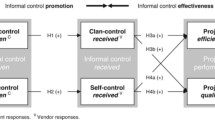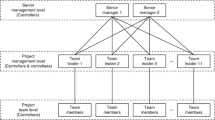Abstract
Control is vital for IS projects to be delivered on time and within budget. Control theory helps us better understand and explain control in information systems operations and development. However, simplistic notions about control do not correspond to how control actually works. We believe that a social perspective that sees controls as negotiated orders, and not just things imposed by controllers on controlees, better explains control of IS projects and operations. Through an interpretive case study of client–vendor control in the IS department of a large agricultural distributor, we show that: (1) control enactment involves the controller’s consideration of the social and organizational context as well as the controller’s intention. (2) Control enactment involves a socially constructed meaning and unintended consequences. (3) The control enactment also involves controlee intent either because of negotiation with the controller, or indirectly by way of alternative structures. Finally, (4) the control itself influences the controller and controlee in unanticipated ways. Seeing control as the result of negotiated orders between controllers and controlees contributes to control theory by suggesting that, in practice, negotiation, shaping and re-appropriation are necessary for successful control enactment.

Similar content being viewed by others
References
Adler, P.S. (2001). Market, Hierarchy, and Trust: The Knowledge Economy and the Future of Capitalism, Organization Science 12(2): 215–234.
Agócs, C. (1997). Institutionalized Resistance to Organizational Change: Denial, Inaction and Repression, Journal of Business Ethics 16(9): 917–931.
Barker, J.R. (1993). Tightening the Iron Cage: Concertive Control in Self-Managing Teams, Administrative Science Quarterly 38(3): 408–437.
Bechky, B.A. (2011). Making Organizational Theory Work: Institutions, Occupations, and Negotiated Orders, Organization Science 22(5): 1157–1167.
Blau, P. (1955). The Dynamics of Bureaucracy: A Study of Interpersonal Relations in Two Government Agencies, London: Sage Publications.
Butler, B.S. and Gray, P.H. (2006). Reliability, Mindfulness, and Information Systems, MIS Quarterly 30(2): 211–224.
Cardinal, L.B., Sitkin, S.B. and Long, C.P. (2004). Balancing and Rebalancing in the Creation and Evolution of Organizational Control, Organization Science 15(4): 411–431.
Choudhury, V. and Sabherwal, R. (2003). Portfolios of Control in Outsourced Software Development Projects, Information Systems Research 14(3): 291–314.
Chua, C.E.H., Lim, W.K., Sia, S.K. and Soh, C. (2012a). Client Strategies in Vendor Transition: A Threat Balancing Perspective, Journal of Strategic Information Systems 21(1): 72–83.
Chua, C.E.H., Lim, W.K., Soh, C. and Sia, S.K. (2012b). Enacting Clan Control In Complex IT Projects, MIS Quarterly 36(2): 577–600.
Crisp, C.B. (2003). Control Enactment in Global Virtual Teams, Austin, TX: Department of Management Science and Information Systems, University of Texas at Austin.
Danziger, J.N. and Kraemer, K.L. (1985). Computerized Data-Based Systems and Productivity Among Professional Workers: The Case of Detectives, Public Administration Review 45(1): 196–209.
Eisenhardt, K.M. (1989). Agency Theory: An Assessment and Review, Academy of Management Review 14(1): 57–74.
Fine, G.A. (1984). Negotiated Orders and Organizational Cultures, Annual Review of Sociology 10: 239–262.
Giddens, A. (1976). New Rules of Sociological Method, London: Hutchinson.
Giddens, A. (1979). Central Problems in Social Theory: Action, Structure, and Contradiction in Social Analysis, London: Macmillan Press.
Giddens, A. (1984). The Constitution of Society: Outline of the Theory of Structuration, Cambridge: Polity Press.
Goo, J. and Huang, C.D. (2008). Facilitating Relational Governance Through Service Level Agreements in IT Outsourcing: An Application of the Commitment-Trust Theory, Decision Support Systems 47(1): 216–232.
Goo, J., Kishore, R., Rao, H.R. and Nam, K. (2009). The Role of Service Level Agreements in Relational Management of Information Technology Outsourcing: An Empirical Study, MIS Quarterly 33(1): 119–145.
Gopal, A. and Koka, B.R. (2012). The Asymmetric Benefits of Relational Flexibility: Evidence From Software Development Outsourcing, MIS Quarterly 36(2): 553–576.
Gopal, A., Sivaramakrishnan, K., Krishnan, M.S. and Mukhopadhyay, T. (2003). Contracts in Offshore Software Development: An Empirical Analysis, Management Science 49(12): 1671–1683.
Govindarajan, V. and Fisher, J. (1990). Strategy, Control Systems, and Resource-Sharing: Effects on Business-Unit Performance, Academy of Management Journal 33(2): 259–285.
Gregory, R.W., Beck, R. and Keil, M. (2013). Control Balancing in Information Systems Development Offshoring Projects, MIS Quarterly 37(4): 1211–1232.
Heimer, C.A. (1985). Allocating Information Costs in a Negotiated Information Order: Interorganizational Constraints on Decision Making in Norwegian Oil Insurance, Administrative Science Quarterly 30(3): 395–417.
Henderson, J.C. and Lee, S. (1992). Managing I/S Design Teams: A Control Theories Perspective, Management Science 38(6): 757–777.
Jaworski, B.J., Stathakopoulos, V. and Krishnan, H.S. (1993). Control Combinations in Marketing: Conceptual Framework and Empirical Evidence, Journal of Marketing 57(1): 57–69.
Kirsch, L.J. (1996). The Management of Complex Tasks in Organizations: Controlling the Systems Development Process, Organization Science 7(1): 1–21.
Kirsch, L.J. (1997). Portfolios of Control Modes and IS Project Management, Information Systems Research 8(3): 215–239.
Kirsch, L.J. (2004). Deploying Common Systems Globally: The Dynamics of Control, Information Systems Research 15(4): 374–395.
Kirsch, L.J. and Cummings, L.L. (1996). Contextual Influences on Self-Control of IS Professionals Engaged in Systems Development, Accounting, Management and Information Technology 6(3): 191–219.
Kirsch, L.J., Ko, D.-G. and Haney, M.H. (2010). Investigating the Antecedents of Team-Based Clan Control: Adding Social Capital as a Predictor, Organization Science 21(2): 469–489.
Kirsch, L.J., Sambamurthy, V., Ko, D.-G. and Purvis, R.L. (2002). Controlling Information Systems Development Projects: The View from the Client, Management Science 48(4): 484–498.
Klein, H.K. and Myers, M.D. (1999). A Set of Principles for Conducting and Evaluating Interpretive Field Studies in Information Systems, MIS Quarterly 23(1): 67–94.
Kling, R. (1977). The Organizational Context of User-Centered Software Designs, MIS Quarterly 1(4): 41–52.
Kling, R. (1980). Social Analyses of Computing: Theoretical Perspectives in Recent Empirical Research, ACM Computing Surveys 12(1): 61–110.
Kotter, J.P. (1996). Leading Change, Boston, MA: Harvard Business School Press.
Kotter, J.P. and Cohen, D.S. (2002). The Heart of Change, Boston, MA: Harvard Business School Press.
Kraemer, K.L. and Danziger, J.N. (1984). Computers and Control in the Work Environment, Public Administration Review 44(1): 32–42.
Lee, Y. and Cavusgil, S.T. (2006). Enhancing Alliance Performance: The Effects of Contractual-Based Versus Relational-Based Governance, Journal of Business Research 59(8): 896–905.
Levitt, S.D. and Dubner, S. (2004). Freakonomics: A Rogue Economist Explores the Hidden Side of Everything, New York: William Morrow.
Li, M. and Edwards, P. (2008). Work and Pay in Small Chinese Clothing Firms: A Constrained Negotiated Order, Industrial Relations Journal 39(4): 296–313.
Lim, W.K., Sia, S.K. and Yeow, A. (2011). Managing Risks in a Failing IT Project: A Social Constructionist View, Journal of the Association for Information Systems 12(6): 414–440.
Maines, D.R. and Charlton, J. (1985). Negotiated Order Approach to the Analysis of Social Organization, In: H.A. Farberman and R. Perinbanayagam (eds.) Foundations of Interpretive Sociology: Original Essays in Symbolic Interaction, Greenwich, CT: JAI Press.
Merton, R.K. (1936). The Unanticipated Consequences of Purposive Social Action, American Sociological Review 1(6): 894–904.
Mullings, B. (1999). Sides of the Same Coin? Coping and Resistance among Jamaican Data-Entry Operators, Annals of the Association of American Geographers 89(2): 290–311.
Myers, M.D. and Newman, M. (2007). The Qualitative Interview in IS Research: Examining the Craft, Information and Organization 17(1): 2–26.
Nidumolu, S.R. and Subramani, M.R. (2003/2004). The Matrix of Control: Combining Process and Structure Approaches to Managing Software Development, Journal of Management Information Systems 20(3): 159–196.
Poppo, L. and Zenger, T.R. (2002). Do Formal Contracts and Relational Governance Function as Substitutes or Complements? Strategic Management Journal 23(8): 707–725.
Prasad, P. and Prasad, A. (2000). Stretching the Iron Cage: The Constitution and Implications of Routine Workplace Resistance, Organization Science 11(4): 387–403.
Ram, M., Edwards, P. and Jones, T. (2007). Staying Underground: Informal Work, Small Firms and Employment Regulation in the UK, Work and Occupations 34(3): 318–344.
Ryall, M.D. and Sampson, R.C. (2009). Formal Contracts in the Presence of Relational Enforcement Mechanisms: Evidence from Technology Development Projects, Management Science 55(6): 906–925.
Saunders, C., Gebelt, M. and Hu, Q. (1997). Achieving Success in Information Systems Outsourcing, California Management Review 39(2): 63–79.
Simon, H.A. (1957). Models of Man, New York: Wiley.
Soh, C., Chua, C.E.H. and Singh, H. (2011). Managing Diverse Stakeholders in Enterprise Systems Projects: A Control Portfolio Approach, Journal of Information Technology 26(1): 16–31.
Strauss, A. (1978). Negotiations: Varieties, Contexts, Processes, and Social Order, San Francisco, CA: Jossey-Bass.
Strauss, A., Schatzman, L., Ehrlich, D., Bucher, R. and Sabshin, M. (1963). The Hospital and Its Negotiated Order, In: E. Freidson (ed.) The Hospital in Modern Society, London: Collier-Macmillan, pp. 147–169.
Swanson, E.B. and Ramiller, N.C. (2004). Innovating Mindfully with Information Technology, MIS Quarterly 28(4): 553–583.
Tiwana, A. and Keil, M. (2007). Does Peripheral Knowledge Complement Control? An Empirical Test in Technology Outsourcing Alliances, Strategic Management Journal 28(6): 623–634.
Tiwana, A. and Keil, M. (2009). Control in Internal and Outsourced Software Projects, Journal of Management Information Systems 26(3): 9–44.
Weber, M. (1930). The Protestant Ethic and the Spirit of Capitalism, London: Allen and Unwin.
Wiener, M., Mähring, M., Remus, U. and Saunders, C. (2016). Control Configuration and Control Enactment in Information Systems Projects: Review and Expanded Theoretical Framework, MIS Quarterly 40(3): 741–774.
Zheng, J., Roehrich, J.K. and Lewis, M.A. (2008). The Dynamics of Contractual and Relational Governance: Evidence from Long-term Public-Private Procurement Arrangements, Journal of Purchasing and Supply Management 14(1): 43–54.
Author information
Authors and Affiliations
Corresponding author
Rights and permissions
About this article
Cite this article
Chua, C.E.H., Myers, M. Social control in information systems development: a negotiated order perspective. J Inf Technol 33, 173–187 (2018). https://doi.org/10.1057/s41265-017-0048-4
Published:
Issue Date:
DOI: https://doi.org/10.1057/s41265-017-0048-4




